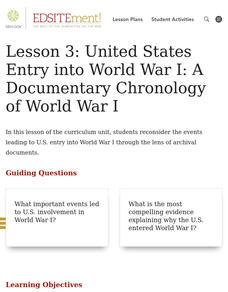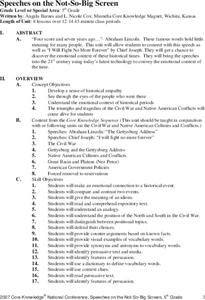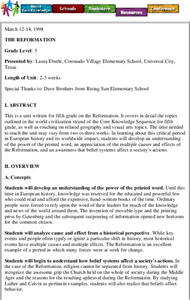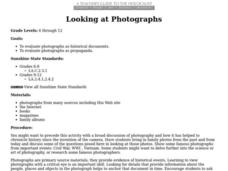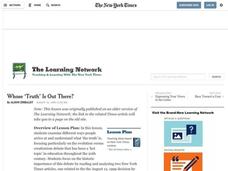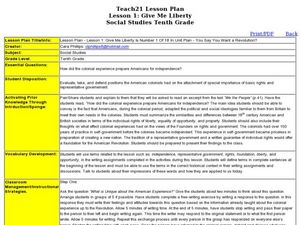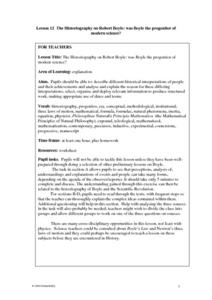Curated OER
United States Entry into World War I: A Documentary Chronology of World War I
Eleventh graders reconsider the events leading to U.S. entry into World War I through the lens of archival documents.
Curated OER
Midnight Ride of Paul Revere: Fact, Fiction, and Artistic License
Students examine The Midnight Ride of Paul Revere. In this visual arts lesson, students study the historical significance of the event as they examine the Grant Wood painting and primary sources regarding the event.
Curated OER
The American Revolution and Its Heroes
Students, through a variety of activities, discover historical aspects of the American Revolution. They make maps and create timelines to track significant events. They create a book about the American Revolution and re-enact Paul...
National Endowment for the Humanities
From Courage to Freedom: The Reality behind the Song
Learners study how Frederick Douglass uses language to describe a realistic picture of slavery in his writings which are primary source documents. They examine his use of word choice, imagery, irony, and rhetorical appeals and use slave...
Curated OER
Follow the Road to Riches
Students study the story of gold and silver mining in the San Juan region. Through the use of interactive video and the Internet, they will examine the various events occurring at this time. They create a timeline highlighting the major...
Curated OER
Ye Olde Middle Ages
Student will be able to compare and contrast the Middle Ages with today. They use technology to better understand the Middle Ages and understand how a castle was built for defense. They then develop an understanding of how people lived...
Curated OER
What is History? Timelines and Oral Histories
Students consider how we learn about the past and discuss how the framing of history is always done by the person who is telling it. They construct a personal and class timelines, compare two or more accounts of the same event and record...
Curated OER
Speeches on the Not-So-Big Screen
Students examine American speeches. In this interdisciplinary lesson, students explore the emotional context of historical periods as they analyze "The Gettysburg Address" and "I Will Fight No More Forever" speeches.
Curated OER
What is a Memorial
Students explore how we remember and honor people in special ways. In this memorial lesson, students read poems and discuss their emotions. Students view pictures taken at memorial services and discuss what some symbols have come to...
Curated OER
The Reformation
Fifth graders identify key events of the Reformation. They recognize the impact of religion during the Middle Ages.
Curated OER
A Differentiated Way through Think Dots
Learners examine reasons that led people to explore, identify "West" as defined following Revolutionary War, explain importance of finding natural resources, develop time line of dates and events leading up to Lewis and Clark Expedition,...
Curated OER
Looking at Photographs
Students evaluate photographs as historical documents and photographs as propaganda.
Curated OER
The Treaty Trail: U.S. - Clothing That Talks: Meaning and Material Culture
Young scholars investigate the cultures of Native Americans and Euro-Americans through their clothing. In this photograph analysis activity, students observe historic photographs and analyze the style of clothes people wore and how it...
Curated OER
Remembering to Never Forget
Young scholars discover how the history of a place or event affects one's present perceptions of that place or event. They examine the current tensions caused by the decision to make Weimar, Germany Europe's cultural capital.
Curated OER
Bigger, Faster, Stronger . . . Higher
Students analyze popular feelings and beliefs about two major disasters: the sinking of the Titanic (1912) and the explosion of the Space Shuttle Challenger (1986). They compile evidence, through research and interviews, about how much...
Curated OER
A Moment in Time
Fifth graders research a year in history. In this research lesson, 5th graders choose a year between 1801 and 1999 and write three research questions to answer about their year. Students must include three major events and investigate...
Curated OER
History Through Picture Books and Photographs
First graders become familiar with historical figures central to the Underground Railroad and anti-slavery.
Curated OER
Whose "Truth" Is Out There?
Students read article It's a Fact: Faith and Theory Collide Over Evolution, and examine different ways people arrive at what 'the truth' is, focusing on the evolution vs creationism debate that has been a hot topic throughout the 20th...
Curated OER
Meet the Underground Railroad
Students research and learn about the Underground Railroad. In this Underground Railroad lesson plan, students take 2 weeks to research an individual, complete journal writings, read passages in small groups, list major events, and more.
Curated OER
Social Sstudies: Change in Space and Time
Students examine the dynamics of change and compare and contrast it with other cultures. They cite examples of how people change over time and explain why it is necessary. Students organize a skit, Webpage, or Powerpoint presentation...
Curated OER
Give Me Liberty
Fourth graders investigate the lives and societal contributions of Patrick Henry and Sojourner Truth. They complete a series of lessons that compare and contrast the biographies, historical context and work of these two revolutionaries.
Curated OER
World War II: Concentration Camps and Refugees
Students explore the experiences of the people in the concentration camps at liberation during World War II. Students read an article on the Liberation of Belsen Concentration Camp and D-Day and report to the class.
Curated OER
Revealing Untold Stories
Students explore how and why various historical resources present information about slavery differently. They work in pairs to examine written texts to interpret the objectives, points of view, and depictions of slavery in these resources.
Curated OER
The Historiography on Robert Boyle: Was Boyle the Progenitor of Modern Science?
High schoolers participate in a warm-up activity by attending a football match writing an account of who won the game. They discuss how their account could differ from someone else's account of the game. They discuss how different...


